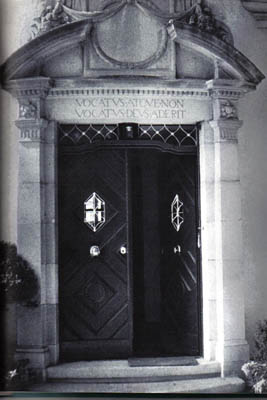Vocatus atque non vocatus deus aderit
Jung carved a Latin inscription above the door of his house in Kusnacht, Switzerland: "VOCATUS ATQUE NON VOCATUS DEUS ADERIT." In English translation, the inscription reads: "Called or not called, the god will be there."

Aniela Jaffe says: "It is the answer the Delphic Oracle gave the Lacedemonians when they were planning a war against Athens" (1979: 136).
In a letter of November 19, 1960, Jung explains the inscription:
By the way, you seek the enigmatic oracle Vocatus atque non vocatus deus aderit in vain in Delphi: it is cut in stone over the door of my house in Kusnacht near Zurich and otherwise found in Erasmus's collection of Adagia (XVIth cent.). [Jung had acquired a copy of the 1563 edition of Erasmus's Collectaneas adagiorum, a compilation of analects from classical authors, when he was 19 years old.] It is a Delphic oracle though. It says: yes, the god will be on the spot, but in what form and to what purpose? I have put the inscription there to remind my patients and myself: Timor dei initium sapiente ["The fear of the Lord is the beginning of wisdom."] Here another not less important road begins, not the approach to "Christianity" but to God himself and this seems to be the ultimate question. (1975: 611)
What was carved above a door in Kusnacht was tattooed on a forearm on 14th Street in New York City in June 2004:

Photograph by Michael Vannoy Adams
References
Jaffe, A. (1979) C.G. Jung: Word and Image, Princeton, NJ: Princeton University Press.
Jung, C.G. (1975) Letters: 1951-1961, ed. G. Adler, A. Jaffe, and R.F.C. Hull, Princeton, NJ: Princeton University Press, vol. 2.